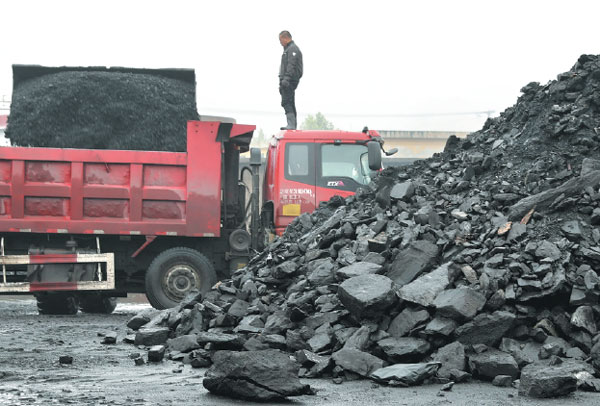Modernization has paid off for the coal industry
By Meng Fanbin (China Daily) Updated: 2017-07-25 07:42Sector's profits set to remain high, following effort to cut overcapacity
Coal industry profits in China are expected to remain high in the second half of the year, thanks to government efforts to cut excessive capacity and the stable growth of the overall economy, said experts.
"The economic recovery has led to rapid growth in the production of basic materials like coal, steel and chemical products," said Zhang Likuan, an analyst at the China Coal Data Exchange Center.
China last Monday reported a faster-than-expected GDP growth of 6.9 percent in the first half of the year. Thermal coal and electricity consumption rose by 8.2 percent and 6.3 percent respectively in the first six months year-on-year, the largest increase in recent years, data from the National Development and Reform Commission show.
|
A huge cargo vehicle unloads coal at a large mine in Huaibei, Anhui province. Tian Sheng / For China Daily |
The total profits of the country's large coal companies amounted to 123.4 billion yuan ($18.13 billion) in the first five months, surging nearly 90 times in comparison with the same period last year, according to statistics from the 2017 Summer National Coal Fair last week.
Yangquan Coal Industry issued its interim forecast report on Monday.
The company estimated that it realized a net profit of 820 million yuan in the first half, surging 865 percent year-on-year.
Around 111 million metric tons of outdated coal capacity were closed in the first half of the year, completing 74 percent of the annual target, NDRC spokesman Yan Pengcheng said on July 18.
There will be less pressure to eliminate outdated capacity in the second half of this year, said Zhang from the China Coal Data Exchange Center.
"As many zombie companies withdraw from the market, major industry players will have a bigger role in allocating resources and planning production, which further improves their business performance and market expectations," said Yan.
When the country's electricity consumption braces for its seasonal peak, thermal coal price will go up significantly and net profits of coal companies will rise, said Bi Fangjing, an analyst at JLC Network Technology Co.
Continuous hot weather is still raging across many regions in China. Weather experts pointed out that high temperatures would continue over the coming days, especially in southern China.
The electricity load of the two power grids in northern and northwestern China and 12 provincial-level power grids has reached a record high.
In fact, coal prices have hovered at high levels since the beginning of this year due to increased demand and tightened supply.
The Bohai-Rim Steam-Coal Price Index, which tracks domestic thermal coal spot prices at six major ports in northern China, remained above 560 yuan per ton in January to July, and was once as high as 606 yuan per ton.
Higher product prices have improved companies' financial performance, especially those in cyclical industries such as coal, iron and steel, and nonferrous metals, said Zhan Sheng, investment director of JZ Investment, a subsidiary of JZ Securities.
"The price is expected to fall back in August and rise again until peak demand in the winter," Bi said.
With the growth of debt-for-equity swaps and the restructuring of coal companies, their operating cost will be further reduced. As a result, Zhang predicted coal companies' profits will continue to grow in the second half.
Efforts to cut excessive coal capacity have prompted the healthy and sustainable development of the sector. In particular, the business conditions of coal companies have improved, said Yan.
Yan also noted that the policy of capacity reduction will remove the inffective and inefficient capacity with high costs and low competitiveness, which will improve the overall efficiency of resource allocation and capacity utilization, and optimize the sector's industrial structure and production layout.
Effective coal capacity in 2017 will be increased by around 200 million tons year-on-year, ensuring the supply of coal and electricity, according to a meeting held by the NDRC on Monday.
mengfanbin@chinadaily.com.cn
- 'Cooperation is complementary'
- Worldwide manhunt nets 50th fugitive
- China-Japan meet seeks cooperation
- Agency ensuring natural gas supply
- Global manhunt sees China catch its 50th fugitive
- Call for 'Red Boat Spirit' a noble goal, official says
- China 'open to world' of foreign talent
- Free trade studies agreed on as Li meets with Canadian PM Trudeau
- Emojis on austerity rules from top anti-graft authority go viral
- Xi: All aboard internet express












